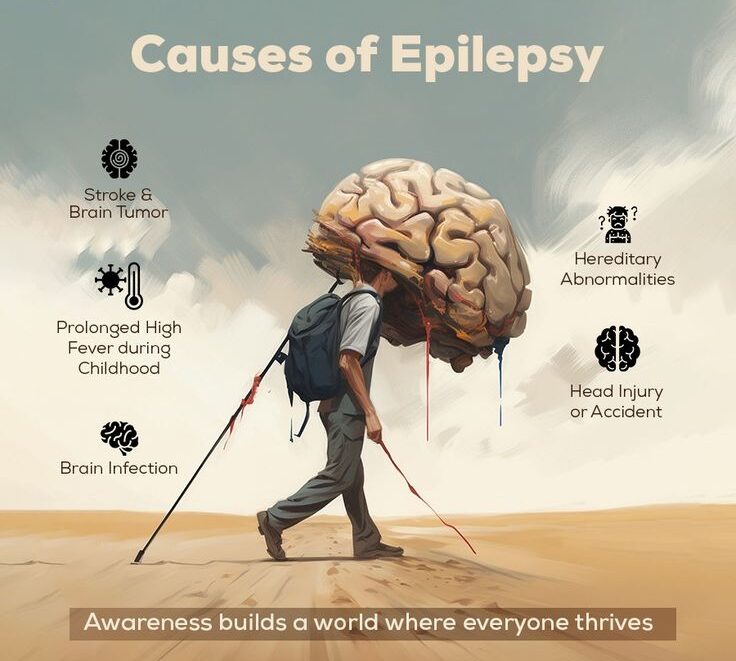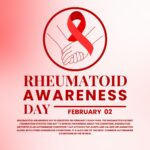🧠 International Epilepsy Day: A Global Movement to Break the Silence
Epilepsy is more than just seizures. It’s a daily challenge for over 50 million people worldwide, many of whom face not only health issues but social stigma, discrimination, and misunderstanding. Every year, the second Monday of February is observed as International Epilepsy Day, a day dedicated to raising awareness, breaking myths, and showing support for those living with epilepsy.
- 🧠 International Epilepsy Day: A Global Movement to Break the Silence
- 🕰️ History of International Epilepsy Day
- 📅 Timeline: Epilepsy Awareness Through the Years
- 📊 9 Powerful Facts About Epilepsy You Should Know
- ❓FAQs: What People Often Ask About Epilepsy
- 🧠 Q1: What is epilepsy in simple terms?
- 💊 Q2: Can epilepsy be cured?
- 👨⚕️ Q3: Can someone with epilepsy live a normal life?
- ❌ Q4: Should you restrain someone during a seizure?
- 🔄 Q5: Is epilepsy a mental illness?
- 🧩 Significance of International Epilepsy Day
- 1. Raising Global Awareness
- 2. Combating Stigma
- 3. Empowering the Epilepsy Community
- 4. Pushing for Policy Change
- 5. Encouraging Early Diagnosis
- 🌍 Observance: How the World Celebrates & Supports
- 🟣 Wearing Purple
- 📢 Social Media Campaigns
- 🧠 Educational Seminars & Webinars
- 🧑🎨 Art & Creativity
- 🏛️ Landmarks Lit in Purple
- 🙏 Wishing Messages for International Epilepsy Day
- 🧬 Why Epilepsy Awareness Is Important in Our Lives
- 🏥 Daily Life Impact: Living With Epilepsy
- 1. Driving Restrictions
- 2. Medication Side Effects
- 3. Mental Health Challenges
- 4. Educational Barriers
- 5. Workplace Discrimination
- 🌟 Importance to Society
- 🔑 Key Takeaways
- 🧭 Conclusion: From Silence to Support
This globally observed day is a call to action for better understanding, research, and inclusion.
🕰️ History of International Epilepsy Day
International Epilepsy Day is a joint initiative by the International Bureau for Epilepsy (IBE) and the International League Against Epilepsy (ILAE).
🗓️ First observed in 2015, the day was envisioned to unite the global epilepsy community — individuals, healthcare professionals, organizations, and policymakers — under one purpose: epilepsy awareness.
It is not disease-specific, meaning it is inclusive of all forms of epilepsy, regardless of age, geography, or cause.
While World Epilepsy Day also exists (often celebrated regionally), International Epilepsy Day is uniquely global and inclusive.
📅 Timeline: Epilepsy Awareness Through the Years
| Year | Milestone |
|---|---|
| 1961 | Formation of the International Bureau for Epilepsy (IBE) |
| 1909 | International League Against Epilepsy (ILAE) is founded |
| 2015 | First International Epilepsy Day celebrated worldwide |
| 2017 | Global events span 120+ countries |
| 2020s | Social media drives global conversations under #EpilepsyDay |
📊 9 Powerful Facts About Epilepsy You Should Know
🧠 Epilepsy affects 1 in 100 people worldwide, making it one of the most common neurological disorders.
👶 It can affect people of all ages, though it most often begins in childhood or later adulthood.
💊 70% of people with epilepsy could live seizure-free with proper diagnosis and treatment.
🌍 80% of people with epilepsy live in low- and middle-income countries, where access to care is limited.
🩺 It’s a chronic brain disorder characterized by recurrent seizures caused by abnormal electrical activity.
🧬 Epilepsy can be caused by genetics, head injury, infections, stroke, or developmental issues—but sometimes the cause is unknown.
⚡ Not all seizures are dramatic convulsions—some are brief absence spells, blinking, or confusion.
❌ Epilepsy is not contagious, and it has no link to mental illness.
💔 Stigma and ignorance remain the biggest barriers for those living with epilepsy.
❓FAQs: What People Often Ask About Epilepsy
🧠 Q1: What is epilepsy in simple terms?
A: Epilepsy is a neurological condition where the brain sends out abnormal signals, causing seizures.
💊 Q2: Can epilepsy be cured?
A: Epilepsy can be managed, and in some cases, seizures may go away entirely. But for most, it is a lifelong condition requiring consistent treatment.
👨⚕️ Q3: Can someone with epilepsy live a normal life?
A: Yes! With the right care, medication, and support, people with epilepsy can work, marry, raise families, and live full lives.
❌ Q4: Should you restrain someone during a seizure?
A: No! Never restrain them. Instead, gently turn them on their side, cushion their head, and stay calm until it passes.
🔄 Q5: Is epilepsy a mental illness?
A: No. Epilepsy is a neurological (brain-related) condition—not a psychiatric one.
🧩 Significance of International Epilepsy Day
1. Raising Global Awareness
This day brings epilepsy into the global conversation, shining light on a condition often misunderstood or ignored.
2. Combating Stigma
Misconceptions about epilepsy still exist. In many cultures, seizures are wrongly associated with spiritual possession or mental illness. This day helps correct those myths.
3. Empowering the Epilepsy Community
By sharing stories and facts, this day empowers individuals and families dealing with epilepsy to advocate for better care and rights.
4. Pushing for Policy Change
International Epilepsy Day encourages governments to include epilepsy in national health agendas, and to improve access to diagnosis, treatment, and medication.
5. Encouraging Early Diagnosis
Through awareness, the day promotes early detection, which leads to better treatment outcomes.
🌍 Observance: How the World Celebrates & Supports
🟣 Wearing Purple
The color purple represents epilepsy. People wear purple clothes, ribbons, or badges to show support.
📢 Social Media Campaigns
Hashtags like #EpilepsyDay, #InternationalEpilepsyDay, and #EpilepsyAwareness are used to spread stories, facts, and messages.
🧠 Educational Seminars & Webinars
Schools, hospitals, and NGOs host awareness talks, first aid training, and panel discussions.
🧑🎨 Art & Creativity
Art exhibitions and writing contests showcase how epilepsy affects lives—and how people thrive despite it.
🏛️ Landmarks Lit in Purple
Monuments and buildings around the world light up in purple, showing solidarity with the epilepsy community.
🙏 Wishing Messages for International Epilepsy Day
🟣 “This International Epilepsy Day, let’s replace ignorance with awareness, and fear with understanding.”
💜 “To the warriors who face every day with courage, you are not alone. The world sees you, hears you, and stands with you.”
🌍 “May this day bring more hope, more understanding, and more light for those walking the epilepsy journey.”
🧠 “On this day, let us all pause, learn, and act. Every seizure matters. Every person matters.”
🧬 Why Epilepsy Awareness Is Important in Our Lives
It saves lives: Knowing seizure first aid can help prevent injuries or death.
It promotes inclusion: Kids and adults with epilepsy can be unfairly excluded from school, jobs, or activities.
It breaks isolation: Many patients feel ashamed or hide their condition. Awareness lets them know they’re not alone.
It leads to better care: Public pressure leads to research funding, affordable medication, and better policies.
🏥 Daily Life Impact: Living With Epilepsy
Epilepsy affects nearly every aspect of daily life, not just during seizures:
1. Driving Restrictions
People with epilepsy may not be allowed to drive unless they’ve been seizure-free for a specific time.
2. Medication Side Effects
Anti-seizure medications can cause drowsiness, mood changes, or memory issues.
3. Mental Health Challenges
Many people with epilepsy deal with anxiety, depression, or low self-esteem due to stigma and unpredictability.
4. Educational Barriers
Kids with epilepsy may miss school frequently or struggle academically if seizures affect cognitive function.
5. Workplace Discrimination
Some employers may hesitate to hire or accommodate those with epilepsy, despite anti-discrimination laws.
🌟 Importance to Society
Health equity: Pushing for epilepsy care addresses broader healthcare gaps.
Empathy & inclusion: Epilepsy awareness teaches compassion—a critical social value.
Better public health systems: Investing in epilepsy services improves overall neurology care.
Disability rights movement: Recognizing epilepsy as a neurological disorder strengthens disability advocacy.
🔑 Key Takeaways
🧠 International Epilepsy Day is observed every second Monday of February.
🟣 It highlights the struggles, hopes, and stories of people with epilepsy.
💊 70% of epilepsy cases are treatable, but lack of awareness and access to care are major barriers.
🙏 The day helps break stigma, improve education, and foster global unity.
📢 Everyone can participate — through learning, sharing, supporting, or simply wearing purple.
🧭 Conclusion: From Silence to Support
International Epilepsy Day is not just a day. It’s a movement. A movement to shatter the silence that surrounds one of the world’s most common but misunderstood neurological conditions.
Let’s not wait until someone we love is affected to start caring. Let’s show the world that people with epilepsy are not broken—they are fighters, survivors, and contributors to our shared humanity.
On this day and every day, let’s be louder than stigma and braver than fear. Because awareness saves lives. And silence helps none.








